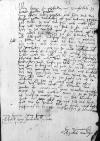Mijn heere, men zegghet ons hier, dat den Charles V of Habsburg (*1500 – †1558), ruler of the Burgundian territories (1506-1555), King of Spain as Charles I (1516-1556), King of Naples and Sicily, King of the Romans (1519-1530), Holy Roman Emperor of the German Nation (elected 1519, crowned 1530, abdicated 1556); son of Philip I the Handsome and Joanna the Mad of Castile⌊keyserCharles V of Habsburg (*1500 – †1558), ruler of the Burgundian territories (1506-1555), King of Spain as Charles I (1516-1556), King of Naples and Sicily, King of the Romans (1519-1530), Holy Roman Emperor of the German Nation (elected 1519, crowned 1530, abdicated 1556); son of Philip I the Handsome and Joanna the Mad of Castile⌋ zoude vertrecken. Est zoo datmen zegghet zoo dinke ic wel dat ghij oeck mette gheselscap zult vertrecken en dat ic hu niet meer zien en zal up dit pas. Ic en weet oft up alle huwe goed(e) vrienscap die ghij mij ghetoech hebt on the margin, in the hand of sender⌈hebthebt on the margin, in the hand of sender⌉ en bidde al est dat wij verre van anderen zijn zullen dat daer omme de vrienscap niet al vergheten mach zijn. Ic zoude wel ghement hebb(en) noch te Brussels (Bruxellae), city in the Low Countries, Duchy of Brabant, since the regency of Mary of Hungary the capital of the Habsburg Netherlands, today the capital of Belgium⌊BrusselBrussels (Bruxellae), city in the Low Countries, Duchy of Brabant, since the regency of Mary of Hungary the capital of the Habsburg Netherlands, today the capital of Belgium⌋ an hu oerlof ghenomen hebb(en) maer de zake en es zoo niet gheleghen ghewest dat Cornelis De Schepper (Cornelius Scepperus, Cornelis De Dobbele, Cornelius Duplicius) (*1503 – †1555), erudite, diplomat in the Habsburgs' service; close friend of Ioannes Dantiscus; initially in the service of Christian II of Oldenburg, King of Denmark; 1526 secretary and councillor to Emperor Charles V of Habsburg (CE, vol. 3, p. 218-220; DE VOCHT 1961, p. 15-24)⌊mijn man superinscribed, in the hand of sender⌈manman superinscribed, in the hand of sender⌉Cornelis De Schepper (Cornelius Scepperus, Cornelis De Dobbele, Cornelius Duplicius) (*1503 – †1555), erudite, diplomat in the Habsburgs' service; close friend of Ioannes Dantiscus; initially in the service of Christian II of Oldenburg, King of Denmark; 1526 secretary and councillor to Emperor Charles V of Habsburg (CE, vol. 3, p. 218-220; DE VOCHT 1961, p. 15-24)⌋ daer ghecom(m)en es voer het vertrecken van d(en) Charles V of Habsburg (*1500 – †1558), ruler of the Burgundian territories (1506-1555), King of Spain as Charles I (1516-1556), King of Naples and Sicily, King of the Romans (1519-1530), Holy Roman Emperor of the German Nation (elected 1519, crowned 1530, abdicated 1556); son of Philip I the Handsome and Joanna the Mad of Castile⌊keiserCharles V of Habsburg (*1500 – †1558), ruler of the Burgundian territories (1506-1555), King of Spain as Charles I (1516-1556), King of Naples and Sicily, King of the Romans (1519-1530), Holy Roman Emperor of the German Nation (elected 1519, crowned 1530, abdicated 1556); son of Philip I the Handsome and Joanna the Mad of Castile⌋. Zoo wille ic oerlof nemen van hu bij briefven en zend(en)(?) hu een cleijn present van een parmisaen van ons lant, niet te ghelickken den parmizaen van Italy (Italia)⌊IjtalienItaly (Italia)⌋ want de lied(en) van onsen land(e) en zijn zoo suptil niet als de The Italians ⌊IjtalijatenThe Italians ⌋ zijn, zoo en mach oeck het ghene dat van daer comt, hu biddende dat in danke te nemen. Mijn heere, waerder eenghe dienst in dit quartier daer in ic hu dienst of vrienscap mochte doen mij dat bevelen zout mij zou altijt ghereet vi(n)d(en), dat kent God die hu verlene dat hu herte meest begheert.


 AAWO, AB, D.90, f. 3v
AAWO, AB, D.90, f. 3v